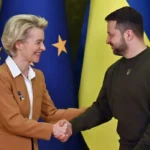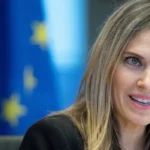On October 7, Shabbat for the Jewish religion, the Palestinian Islamist movement Hamas, classified since 2013 by the European Union and other states as a terrorist organization, began to carry out a series of armed attacks from the Strip of Gaza against Israeli territory. These recent developments are part of a conflict which has afflicted the Middle East for around 75 years and which has still not found a definitive resolution. Israel’s defensive response, which did not spare the Palestinian civilian population and also came close to possible serious violations of international law, divides the Member States of the European Union in terms of safeguarding humanitarian law.
In the general framework of a conflict as complex as it is long-lasting, the European Union has always tried to position itself as an intermediary, promoting diplomatically and at an international level the right to the existence of an Israeli State and a Palestinian state. Indeed, it maintains solid economic relations with Israel and it constitutes the primary financial support of the Palestinian Authority, the provisional administrative entity responsible for governing the West Bank in accordance with the Oslo Accords of 1994. However, recent developments have shake the balance of the European position.
Divergent positions and contrasting reactions
The inconsistencies, which are not exclusively linked to the different positions of each Member State, manifested themselves on the institutional level two days after the first Hamas attacks. This happened when the European Commissioner for Neighborhood Policy, Hungarian Olivér Várhelyi, deliberately announced the suspension of humanitarian aid to Palestine from the EU. This decision was denied the same evening by the High Representative of the Union for Foreign Affairs and Security Policy Josep Borrell, who reaffirmed the importance of providing humanitarian and financial aid to Palestine, although better controlled by verifications prior to payments in order to prevent these sums of money from being able to finance Hamas in any way. Mr. Borrell further called on the Israeli government to reconsider its way of organizing its self-defense, given that several actions undertaken by Israel constitute serious violations of international humanitarian law, including the total blockade of Gaza and reprisals to the detriment of the civilian population.
Following this significant stance by the EU’s “chief diplomat”, on October 13, European Commission President Ursula von der Leyen decided to undertake a controversial trip to Israel, where she strongly supported the country’s right to defend itself. However, she did not mention the unavoidable need to respect international law in these actions (contrary to what Israel has considered doing so far). Nor did she organize a visit to the Palestinian territories where the civilian population is subject to unjustifiable atrocities. This obviously gave rise to numerous criticisms and discontent within the European Union, since the President of the Commission clumsily failed to take into account European polyphony, but above all to convey the image of an EU ready to ensure respect of general international and humanitarian law, unlike what it did during the conflict in Ukraine. However, Ms. von der Leyen justified her trip, saying that “there is no contradiction between solidarity with Israel and responding to the humanitarian needs of the Palestinians.”
Measures from European institutions
On October 19, the European Parliament appeared to find a common compass by adopting a resolution to condemn Hamas attacks against Israel and to promote respect for humanitarian law in Gaza, through a so-called “humanitarian pause”, but without mention of a ceasefire. With this formulation, we only foresee a temporary cessation of fighting for reasons linked to the provision of humanitarian aid to the population and not a definitive cessation of the conflict. This led to several criticisms from certain parties, despite the general success of the resolution with the institution considered to be the symbol of democratic representation in the EU.
It was during the European Council of October 26 that the Member States of the European Union finally tried to define a common position, which could summarize their diversity of opinions in the face of a sensitive and complex context, despite the unanimity concerning the indisputable condemnation of Hamas attacks. After five hours of negotiations, focusing in particular on the best lexical choice to properly describe their will in the face of the conflict, the EU heads of state and government took up the formulations already contained in the Parliament resolution. Namely that of the “humanitarian pause” (indicated on this occasion with the expression humanitarian truce, under the proposal of France), this time a real compromise between the search for a ceasefire encouraged by Spain and Israel’s right to self-defense reaffirmed by Germany. This truce provides for the creation of humanitarian corridors that can ensure the subsistence of the Palestinian civilian population as well as respect for their rights in accordance with international law, with strong attention paid to the fact that goods intended for Palestinians do not end up between the in the hands of Hamas or other terrorist organizations.
EU divides its votes at the UN
However, the fact of having found a common voice acceptable to all the member states of the European Union did not prevent them from favoring their own national position at the level of the United Nations General Assembly. It was there that Jordan presented a draft resolution on “protection of civilians and compliance with legal and humanitarian obligations,” which was ultimately adopted. During this event, which took place on October 27, the 27 member states voted differently, breaking the harmony created the day before at European level and demonstrating once again a strong lack of cohesion in terms of foreign policy.
This obviously gives rise to many doubts regarding the credibility of the EU not only as a geopolitical actor in the Middle East, but above all as an international mediator, having difficulty maintaining a solid common position even with regard to protection. human rights and international law.
This article is originally published on taurillon.org






